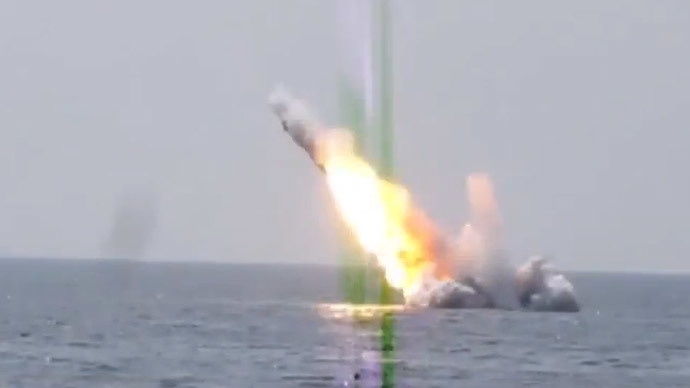Iran test-fires ‘new strategic weapon’ to battle ‘Great Satan’ US

Iran has concluded a massive naval and air defense war games by successfully test-firing a “new strategic weapon,” which the country says will play an important role in the future battle against the US.
The test was performed on the final day of the Great Prophet 9 exercises, which above other activities included a simulated attack on an American aircraft carrier.
READ MORE: Iran bombards ‘mock’ US aircraft carrier in naval drills
The Iranian Revolutionary Guard staged its war games in the strategic Strait of Hormuz, the only sea passage from the Persian Gulf, through which about one-fifth of the world's oil passes.
"The new weapon will have a very decisive role in adding our naval power in confronting threats, particular by the Great Satan, the US," Admiral Ali Fadavi, Iran’s navy chief, told the Revolutionary Guards' website.
In his later interview with Iranian state television, Fadavi said that the details of the new weapon may be made public in coming years.
"We have restrictions [on] expressing specifications and applications of the weapon," he said.
Iranian state TV only showed a short video of missiles being fired into the sky from underwater during daytime, AP reported.
Iran frequently announces tests of new advanced weaponry, but those claims are hard to independently verify as they’re rarely backed by any significant proof.
According to Iran’s military, the Great Prophet 9 war games, which kicked off Wednesday, also saw a robot armed with a machine gun into action.
READ MORE: Iran tests ‘combat robot with machine gun’ at massive drills
In January, Iran said it had activated its own “real Iron Dome” missile defense system, which makes the airspace above the Islamic Republic the safest in the Middle East.
By the early 1990s, Iran has developed a strong military industry, capable of fulfilling all of the country’s needs in arms as it produces mortars, tanks, torpedoes, jet fighters and light submarines.
The Revolutionary Guard possesses an advanced arsenal of missiles capable of striking as far away as Israel and US military bases in the Middle East.
Tehran and the P5+1 powers (the US, Russia, China, Britain and France, plus Germany) are in the decisive stage of the talks aimed at reaching compromise over Tehran’s nuclear program.
The West blames the Iranian authorities of trying to develop a nuclear-weapons capability, but Tehran insists that its program is for peaceful purposes.
The sides expect to reach a framework agreement in the coming weeks and to finalize the deal on the Iranian nuclear program in June.












